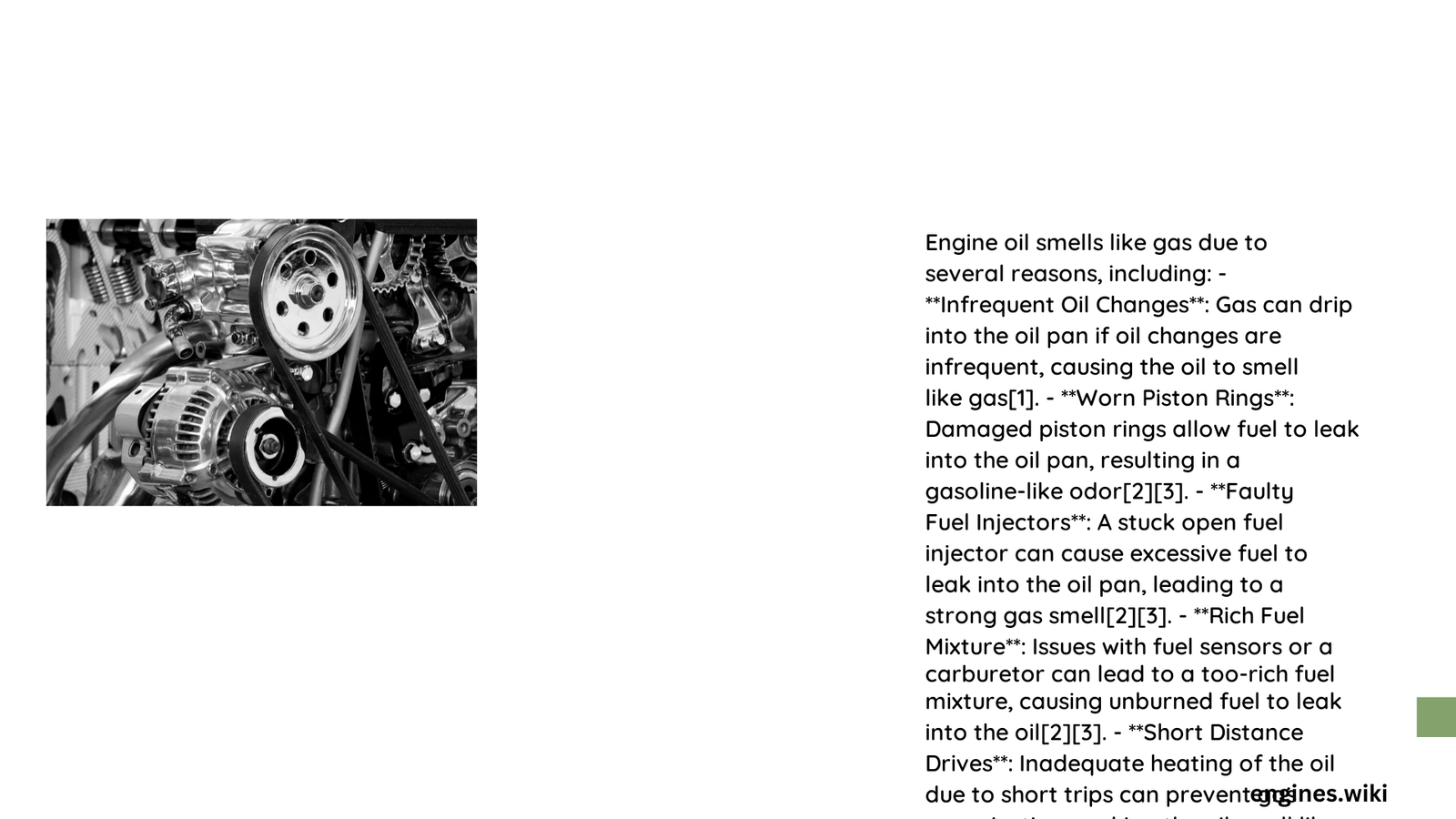Engine oil smelling like gasoline is a critical automotive issue that signals potential internal problems within your vehicle’s engine system. This phenomenon occurs when fuel inadvertently mixes with lubricating oil, compromising engine performance and potentially leading to significant mechanical damage. Understanding the root causes, symptoms, and appropriate remedial actions can help vehicle owners prevent costly repairs and maintain optimal engine health.
What Causes Engine Oil to Smell Like Gasoline?
Why Do Fuel Contamination Occur?
Fuel contamination in engine oil can result from multiple mechanical failures:
- Injector Malfunction
- Leaking fuel injectors
- Improper sealing mechanisms
-
Compromised injection system components
-
Piston Ring Deterioration
- Worn or damaged piston rings
- Reduced compression capabilities
- Increased fuel penetration into crankcase
How Can You Detect Fuel Contamination?
Diagnostic Indicators
- Strong gasoline odor when checking dipstick
- Unusually thin oil consistency
- Lighter oil coloration
- Increased engine noise
- Rough idling performance
| Contamination Level | Potential Consequences |
|---|---|
| 0-5% | Minor performance issues |
| 5-10% | Moderate engine stress |
| 10%+ | Significant mechanical risk |
What Are the Potential Risks of Ignoring Fuel-Contaminated Oil?

Immediate Performance Implications
- Reduced lubrication effectiveness
- Increased friction between engine components
- Accelerated wear on critical mechanical parts
- Potential long-term engine damage
Economic Impact
Vehicle owners might face substantial repair costs ranging from:
– Minor repairs: $500 – $1,500
– Major engine overhaul: $2,000 – $4,000
– Complete engine replacement: $4,000 – $8,000
How to Prevent and Address Fuel Contamination?
Proactive Maintenance Strategies
- Regular oil change intervals
- Professional diagnostic checks
- Address warning signs immediately
- Use high-quality engine components
- Maintain proper fuel system health
Recommended Diagnostic Steps
- Perform dipstick smell test
- Use professional diagnostic tools
- Conduct comprehensive oil analysis
- Consult certified automotive technicians
Expert Recommendations
Quick Troubleshooting Guide
- Immediate Action: Stop driving if significant fuel contamination is detected
- Professional Inspection: Schedule comprehensive engine evaluation
- Oil Replacement: Use manufacturer-recommended oil specifications
Prevention Techniques
- Maintain consistent driving patterns
- Avoid frequent short-distance trips
- Ensure regular vehicle maintenance
- Monitor engine performance indicators
Technical Insights
Fuel Contamination Mechanisms
- Compromised fuel injection systems
- Faulty carburetor configurations
- Damaged piston ring seals
- Incomplete combustion processes
Scientific Perspective
Fuel contamination represents a complex interaction between mechanical components, requiring precise engineering solutions and proactive maintenance strategies.
Conclusion
Understanding why engine oil smells like gasoline involves recognizing multiple mechanical factors. Prompt detection, professional diagnosis, and immediate corrective actions can prevent extensive engine damage and maintain vehicle performance.
Reference:
– ElectronicsHub: Engine Oil Smell Analysis
– Shield Oils: Fuel Contamination Guide
– Automotive Diagnostic Resources
